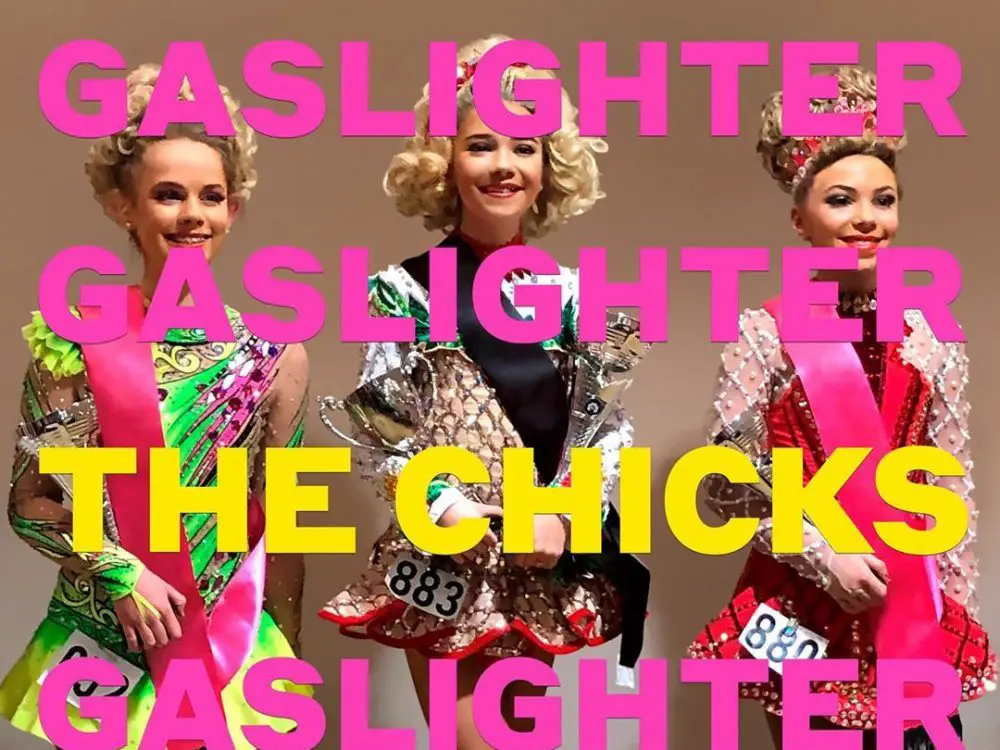The Chicks (previously known as the Dixie Chicks) released their fifth studio album, Gaslighter, in mid-July. All 12 tracks drip with raw emotion. Separately, each track can be heard as an open letter to various individuals (an ex-husband, a daughter, potential future suitors, women experiencing heartbreak everywhere). Together, the open letters form a cohesive companion for the brokenhearted.
Formed in 1989 as a country-bluegrass group, the Chicks are now a pop-country band known for powerful, story-like ballads such as “Wide Open Spaces,” “Travelin’ Soldier” and “Cowboy Take Me Away.” The band consists of three female vocalists and instrumentalists, all of whom call Texas home. Natalie Maines leads the trio with her untiring, bold vocals, which sisters Martie and Emily Erwin complement seamlessly with their own vocal harmonies and with their guitars, fiddles, banjos and keyboards.
The Chicks signature vocal harmonies are still the driving energy at the heart of “Gaslighter.” In fact, the first track, from which the album takes its name, opens with all three voices in strong synchronicity, setting the tone of the album immediately. Instrumentally however, the Chicks explore a more minimal, pop-esque sound throughout the album’s 12 tracks, straying from their classic bluegrass twang with the incorporation of synthesizers and electronic drum kits.
Lyrically, the songs are mostly inspired by Maines’ recent divorce. However, all three women have been through divorces, and shared heartbreak fuels the rich knee-deep emotions of the album. While some artists might choose to express pain in subtle metaphors and hide behind flowery language, the Chicks choose brutal, in-your-face honesty. Maines shares the ugly details of the divorce with all her listeners, including an encounter with her ex-husband’s new lover, their complicated financial agreements and a vivid description of discovering another woman’s tights on her boat.
The Chicks have never shied away from honesty, though. In fact, at a concert in 2002, Maines made a comment denouncing former President George Bush. Following the incident, the Chicks were “cancelled” by all major country music outlets. They responded with the angry ballad “Not Ready to Make Nice.” With grit and determination but without moral compromise, the band made its way back into public favor. Since then, the Chicks have steadfastly promoted social justice causes and managed to retain their country music fan base, which is no easy feat.
Most of the album’s tracks are addressed, presumably, to Maine’s ex-husband, though they may also address the ex-husbands of the Erwin sisters. “Gaslighter” brashly accuses an ex-husband figure of emotional manipulation, cheating and hypocrisy. Pure, unadulterated anger bursts from every musical phrase and lyric.
“Sleep at Night” addresses the same man and asks him, essentially, how he can live with himself after acting so immorally. “Tights On My Boat,” referring to “the other woman,” is an indignant open letter to the same man, promising bad karma in return for his misdeeds: “Yeah, you can tell the girl who left her tights on my boat/ that she can have you now/ You’re gonna get what you got comin’ to ya.” These tracks taste like sweet revenge.
Heartbreak is complicated, though, and the Chicks represent its myriad nuances. “Everybody Loves You” deals with the confusion of controlling one’s own conflicting impulses and ruminations. Maines urges herself to forgive someone she’s clearly internalized deep anger toward and wishes this person weren’t so widely loved: “It’s my body and I’m trying to hate you ’cause I want to/ It’s my body and I’m trying to while everybody loves you/ It’s my body and I’m trying to forgive you, I don’t want to/ It’s my body and it hates you, why does everybody love you?”
In songs like this one, “Gaslighter” proclaims that it’s okay to feel unbelievably angry and still in love at the same time. In openly, honestly sharing their internal contradictions, the Chicks validate the complicated tangle of emotions listeners might also be experiencing.
“For Her” and “Young Man” address Maines’ children in clear recognition that the heartbreak of divorce extends to the next generation. In these songs, Maines refrains from her sharper jabs at her ex-husband and instead focuses on empowering her children. During “For Her,” the lyrics oscillate between motherly advice for her daughter and self-reflective motherly advice. Complemented by a subtle organ and soft keyboard, Maines’ voice cries out in beautiful desperation: “Stand up, show love for her, for her.”
“My Best Friend’s Weddings” is, in part, a reflection of the course of a 20-year relationship, but moreover, it is an assurance of personal growth, self-empowerment and good things to come. During the bridge of the song, all three voices coalesce in the song’s musical crescendo, echoing the lyrics “Go it alone, go it alone.” The beautiful irony of unified voices proclaiming independence is a clear message: We’re on our own journeys, but we’re still in this together. The song, like much of the album, is a celebration of post-heartbreak female empowerment and solidarity. Yet again, the message welcomes listeners in and affirms their own emotional journeys.
The beauty of these honest, epistolary songs is that they are open letters. In other words, the Chicks invite us into their world, their hearts and their heartaches. Maines invites us not to feel for her but with her. Listening between the lines, I felt the Chicks giving me permission to be vulnerable, to be angry, to be desperately lonely and to empower myself to be okay. “Everyone has a gaslighter in their lives, right?” said Erwin in an interview with CBS News, further validating the idea that though the songs are based on specific experiences, the feelings are universal.
“Julianna Calm Down,” a track toward the end of “Gaslighter,” is addressed to 11 women: Julianna, Harper, Katie, Eva, Violet, Juno, Yaya, Berta, Hesper, Amelia and Naomi. Maines encourages each of the girls, in turn, to shake off the pain an unnamed “he” has inflicted and promises them everything will be all right. Perhaps these names represent specific women the Chicks know, but more likely, the names stand in for all female Chicks fans, especially those experiencing the pain of a broken heart.
The song leans into a female fan base and creates, if only for four and a half minutes, a feminist women’s support group. The song, then, is a stand-in for the words of a comforting and understanding but firm friend. Again, the Chicks invite the emotions of the listeners into their own songs.
So, if you’re hurting all alone, don’t. Put “Gaslighter” on the stereo, and process all the complications of heartbreak right alongside the Chicks.

















